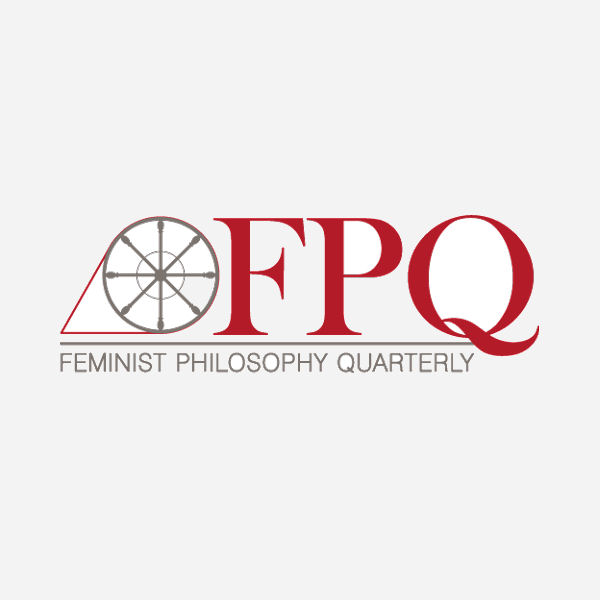articles
-
The political power of your body – INTACT in iai news
We all feel pressure for our bodies to look a certain way: 70% of women say they feel pressure to have a perfect body, and two thirds of men feel ashamed of how they look. However, those pressures don’t affect everyone equally. The standards by which our bodies are judged reflect and reinforce other unjust societal hierarchies. Furthermore, the failure to adhere to society’s beauty standards is often interpreted as a deeper failure of character, encompassing our entire identity. By being aware of the sources of these pressures we can remind ourselves that the unmodified body is valuable just as it is, writes Clare Chambers.
Read the whole article here.
-
Re-Reading A Theory of Justice
Is there anything new left to say about A Theory of Justice?
In this brief paper I reflect on this question, on the basis of re-reading the text fifty years since John Rawls first published it, and twenty-five years since I first encountered it as an undergraduate.In the journal Polity, online first (2021). You can read it here:
- all posts on feminism, all posts on liberalism, all posts on the body and beauty, articles, feminism, liberalism, the body
Sex, Money, and Luck in Sport

Clare Chambers, “Sex, Money, and Luck in Sport” published in Journal of Medical Ethics Vol. 46 No. 9 (2020). You can read the paper here.
- all posts on culture and religion, all posts on feminism, all posts on liberalism, articles, feminism, liberalism, multiculturalism and religion
Respect, Religion, and Feminism
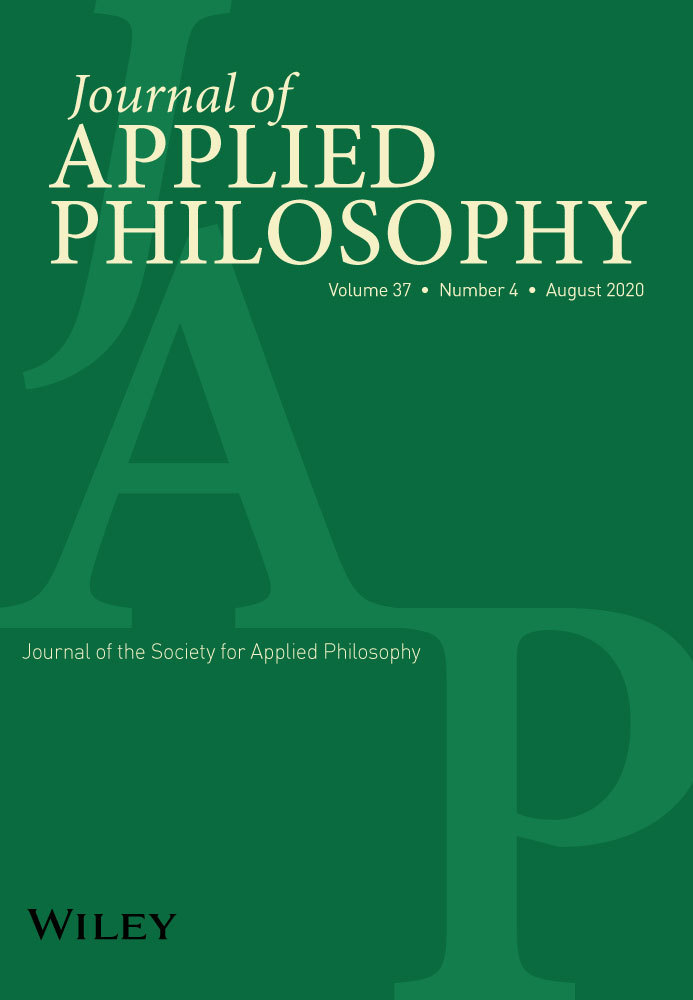
Respect, Religion, and Feminism: Comments on Lori Watson and Christie Hartley, Equal Citizenship and Public Reason: A Feminist Political Liberalism is published in Journal of Applied Philosophy September 2020. You can read the paper here.
Abstract: There is significant disagreement among feminists and liberals about the compatibility between the two doctrines. Political liberalism has come under particular criticism from feminists, who argue that its restricted form of equality is insufficient. In contrast, Lori Watson and Christie Hartley argue that political liberalism can and must be feminist. This article raises three areas of disagreement with Watson and Hartley’s incisive account of feminist political liberalism. First, it argues that an appeal to a comprehensive doctrine can be compatible with respecting others, if that appeal is to the value of equality. Second, it takes issue with Watson and Hartley’s defence of religious exemptions to equality law. Third, it argues that political liberalism can be compatible with feminism but that it is not itself adequately feminist. It concludes that political liberalism is not enough for feminists.
- all posts on culture and religion, all posts on the body and beauty, articles, multiculturalism and religion, the body
Medically unnecessary genital cutting and the child’s right to bodily integrity: an international expert consensus statement
In American Journal of Bioethics Vol. 19 (2019).
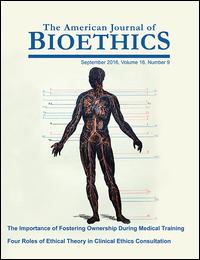
Keeping our focus exclusively on a Western context for the purposes of this article, we argue as follows: Under most conditions, cutting any person’s genitals without their informed consent is a serious violation of their right to bodily integrity. As such, it is morally impermissible unless the person is nonautonomous (incapable of consent) and the cutting is medically necessary.
This paper is authored by the Brussels Collaboration on Bodily Integrity (2019).
This work grew out of informal discussions among participants in the G3 International Experts Meeting on FGM/C in Brussels, Belgium, May 20-22, 2019, along with other scholarly collaborators. We are physicians, ethicists, nurse-midwives, public health professionals, legal scholars, political scientists, anthropologists, psychologists, sociologists, philosophers, and feminists from Africa, Asia, Australasia, Europe, the Middle East, and the Americas with interdisciplinary expertise in child genital cutting practices across a wide range of cultural contexts.
You can read the paper here.
Corresponding author: Brian D. Earp, Associate Director, Yale-Hastings Program in Ethics and Health Policy, Yale University and The Hastings Center, 2 Hillhouse Avenue, New Haven, CT, 06511, USA. E-mail: brian.earp@gmail.co
-
Against Marriage at Aeon
 I have a 3,300 word essay on “Against Marriage” at Aeon magazine. You can read the article here.
I have a 3,300 word essay on “Against Marriage” at Aeon magazine. You can read the article here. - all posts on feminism, all posts on social construction, articles, beauty, feminism, social construction
Ideology and Normativity
 This paper investigates the possibility of what Sally Haslanger calls ‘ideology critique’. It argues that ideology critique cannot rely on epistemological considerations alone but must be based on a normative political theory. Since ideological oppression is denied by those who suffer from it is it is not possible to identify privileged epistemological standpoints in advance.
This paper investigates the possibility of what Sally Haslanger calls ‘ideology critique’. It argues that ideology critique cannot rely on epistemological considerations alone but must be based on a normative political theory. Since ideological oppression is denied by those who suffer from it is it is not possible to identify privileged epistemological standpoints in advance.You can read the paper here and on the OUP Philosophy Festival Reading List here.
-
Judging Women: 25 Years Further Toward a Feminist Theory of the State
Feminist Political Quarterly (Vol. 3 No. 2, 2017).
The title of this paper is “Judging Women”, a phrase that can be understood in three senses. First, when is it acceptable or necessary to make judgements about what women do? Feminists may be wary of subjecting women’s choices and actions to criticism, but the paper argues that such criticism is implied by a feminist perspective on patriarchy, a perspective which is necessarily critical. Second, when can women engage in the act of judging? The paper argues that being judgmental is popularly considered a vice, but only when done by women. Feminism should insist on women’s right to judge. Third, how are we to judge who counts as a woman? The paper investigates the commonalities and contrasts between feminism and trans issues, and discusses the concepts of essentialism and transphobia. The focus throughout is on MacKinnon’s work, which offers profound, sustained, rich analysis of these questions but does not fully resolve them.
You can read the paper here.
- all posts on culture and religion, all posts on liberalism, articles, liberalism, multiculturalism and religion, read
Liberal Views
-
The Marriage-Free State
 Proceedings of The Aristotelian Society (2013). This paper sets out the case for abolishing state-recognised marriage and replacing it with piecemeal regulation of personal relationships. It starts by analysing feminist objections to traditional marriage, and argues that the various feminist critiques can best be reconciled and answered by the abolition of state-recognised marriage. The paper then considers the ideal form of state regulation of personal relationships. Contra other recent proposals equality and liberty are not best served by the creation of a new holistic status, such as civil union, or by leaving regulation to private contracts. Instead, the state should develop piecemeal regulations that apply universally. You can read the paper and listen to the podcast here or on the OUP Philosophy Festival Reading List here.
Proceedings of The Aristotelian Society (2013). This paper sets out the case for abolishing state-recognised marriage and replacing it with piecemeal regulation of personal relationships. It starts by analysing feminist objections to traditional marriage, and argues that the various feminist critiques can best be reconciled and answered by the abolition of state-recognised marriage. The paper then considers the ideal form of state regulation of personal relationships. Contra other recent proposals equality and liberty are not best served by the creation of a new holistic status, such as civil union, or by leaving regulation to private contracts. Instead, the state should develop piecemeal regulations that apply universally. You can read the paper and listen to the podcast here or on the OUP Philosophy Festival Reading List here. -
Each outcome is another opportunity
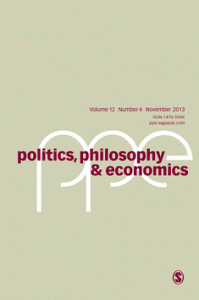 Politics, Philosophy and Economics (PPE) Vol. 8 No. 4 (2009).
Politics, Philosophy and Economics (PPE) Vol. 8 No. 4 (2009).This paper introduces the concept of a Moment of Equal Opportunity (MEO): a point in an individual’s life at which equal opportunity must be applied and after which it need not. The concept of equal opportunity takes many forms, and not all employ an MEO. However, the more egalitarian a theory of equal opportunity is, the more likely it is to use an MEO. The paper discusses various theories of equal opportunity and argues that those that employ an MEO are problematic. Unjust inequalities, those that motivate the use of equal opportunity, occur throughout peoples’ lives and thus go unrectified after an MEO. However, it is not possible to abandon the MEO approach and apply more egalitarian versions of equal opportunity throughout a person’s life since doing so entails problems of epistemology, efficiency, incentives and counter-intuitive results. The paper thus argues that liberal egalitarian theories of equality of opportunity are inconsistent if they support an MEO and unrealisable if they do not.
You can read this paper here.
-
Coercive redistribution and public agreement: re-evaluating the libertarian challenge of charity
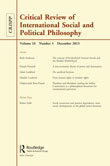 (with Phil Parvin) in Matt Matravers and Lukas Meyer (eds.), Democracy, Equality, and Justice (Routledge and special issue of Critical Review of International Social and Political Philosophy (CRISPP) Vol. 13 No. 1 (2010).
(with Phil Parvin) in Matt Matravers and Lukas Meyer (eds.), Democracy, Equality, and Justice (Routledge and special issue of Critical Review of International Social and Political Philosophy (CRISPP) Vol. 13 No. 1 (2010).
In this article, we evaluate the capacity of liberal egalitarianism to rebut what we call the libertarian challenge of charity. This challenge states that coercive redistributive taxation is neither needed nor justified, since those who endorse redistribution can give charitably, and those who do not endorse redistribution cannot justifiably be coerced. We argue that contemporary developments in liberal political thought render liberalism more vulnerable to this libertarian challenge.
Many liberals have, in recent years, sought to recast liberalism such that it is more hospitable to cultural, religious, and ethnic diversity. This move has resulted in increased support for the claim that liberalism should be understood as a political rather than comprehensive doctrine, and that liberal institutions should draw their legitimacy from agreements made among members of an appropriately conceived deliberative community, rather than from controversial liberal principles like individual autonomy. We argue that, while this move may indeed make liberalism more compatible with cultural diversity, it also makes it more vulnerable to the libertarian challenge of charity. Not all versions of liberalism are troubled by the challenge, but those that are troubled by it are increasingly dominant.
We also discuss G.A. Cohen’s claim that liberal equality requires an ‘egalitarian ethos’ and argue that, if Cohen is right, it is difficult to see how there can be an adequate response to the libertarian challenge of charity. In general, our argument can be summarised as follows: the more that liberalism is concerned accurately to model the actual democratic wishes and motivations of the people it governs, the less it is able to justify coercively imposing redistributive principles of justice.
You can read a copy of this paper here.
-
Inclusivity and the constitution of the family
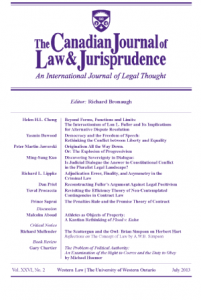 Canadian Journal of Law and Jurisprudence (2009, 1).
Canadian Journal of Law and Jurisprudence (2009, 1).This article responds to Alan Brudner’s Constitutional Goods. It argues that Brudner’s concept of liberal inclusivity is problematic both conceptually and normatively, and results in policies on marriage and abortion that liberals would not accept. Issue No. 2 includes a response from Brudner.
-
Torture as an evil: Response to Claudia Card
 Criminal Law and Philosophy Vol. 2 No. 1 (January 2008).
Criminal Law and Philosophy Vol. 2 No. 1 (January 2008).This article argues that, while Claudia Card is right to reject proffered excuses for torture, her strategy for demonstrating that torture is an evil and thus inexcusable is problematic. You can read the paper here.
-
Masculine domination, radical feminism and change
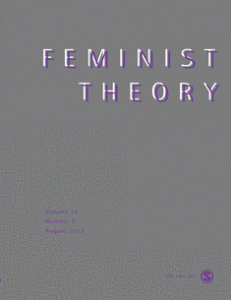 Feminist Theory Vol. 6 No. 3 (December 2005).
Feminist Theory Vol. 6 No. 3 (December 2005).This article argues that the feminist turn to Pierre Bourdieu in an attempt to conceptualise the tension between freedom and agency is helpful, but is made more so when the similarities between the work of Bourdieu and radical feminist Catharine MacKinnon are noticed. MacKinnon’s strategies for change, particularly consciousness-raising, are well suited to a Bourdieuean approach.
You can read the paper here.
- all posts on culture and religion, all posts on feminism, all posts on the body and beauty, articles, feminism, liberalism, multiculturalism and religion, the body
Autonomy and equality in cultural perspective: Response to Sawitri Saharso
 Feminist Theory Vol. 5 No. 3 (December 2004).
Feminist Theory Vol. 5 No. 3 (December 2004).This paper criticises Sawitri Saharso’s argument that hymen repair surgery and sex-selective abortion can be both multiculturalist and feminist policies.
You can read the paper here.
- all posts on culture and religion, all posts on feminism, all posts on liberalism, all posts on social construction, all posts on the body and beauty, articles, beauty, feminism, the body
Are breast implants better than female genital mutilation? Autonomy, gender equality and Nussbaum’s political liberalism
 Critical Review of International Social and Political Philosophy (CRISPP) Vol. 7 No. 3 (Autumn 2004).
Critical Review of International Social and Political Philosophy (CRISPP) Vol. 7 No. 3 (Autumn 2004).This paper outlines two forms of autonomy, and argues that political liberals such as Martha Nussbaum wrongly prioritise second-order autonomy. As a result, they cannot provide adequate criticism of unjust social norms. The two cases of breast implants and female genital mutilation are compared to illustrate this point.
- all posts on culture and religion, all posts on liberalism, articles, liberalism, multiculturalism and religion
Nation-building, Neutrality and Ethnocultural Justice: Kymlicka’s ‘Liberal Pluralism’
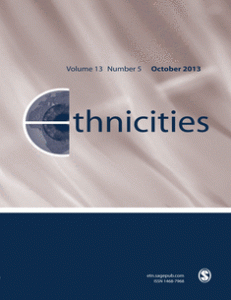 Ethnicities Vol. 3 No. 3 (September 2003).
Ethnicities Vol. 3 No. 3 (September 2003).This paper takes issue with Will Kymlicka’s arguments on ethnocultural justice. It argues that liberal nation-building is not the same thing as minority nation-building, and that the former need not cause injustice to minority ethnocultural groups.
You can read the paper here.


